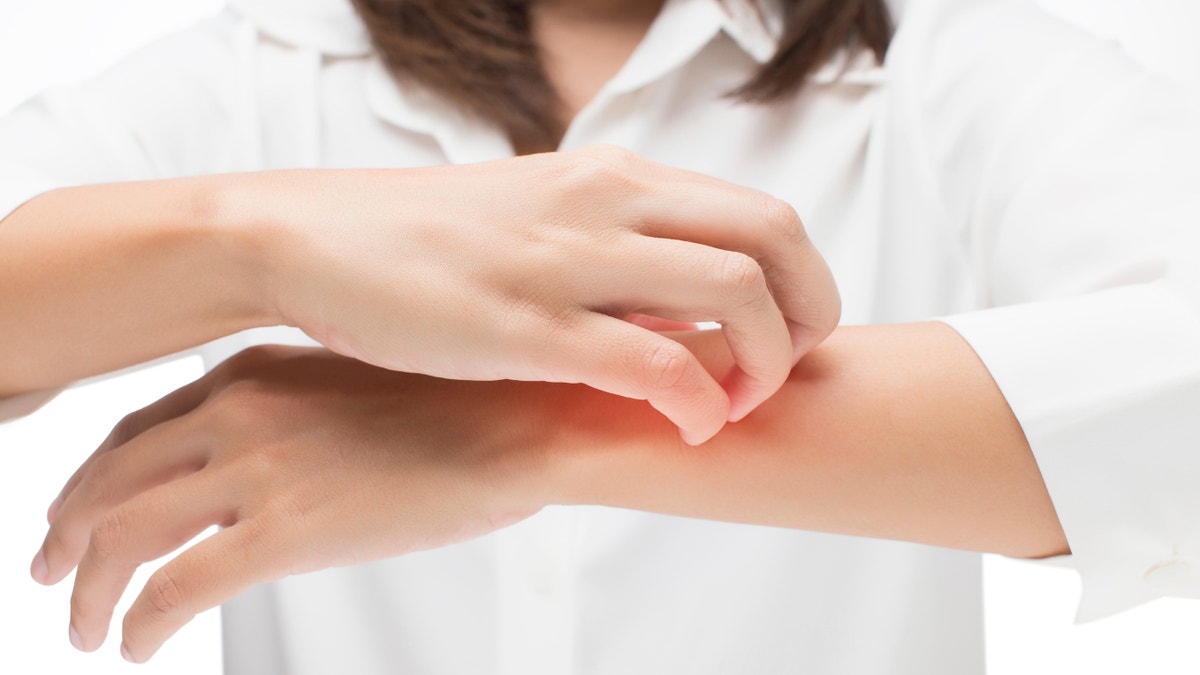
Women scratch the itch with hand, isolate on white background (Tharakorn)
Ever notice how mosquitoes seem to frantically feast on some folks while ignoring others? It's not just your imagination, said entomologist Joseph M. Conlon, a technical advisor to the American Mosquito Control Association. "There is no question that some individuals are more attractive to mosquitoes due to chemicals they secrete from their skin and from their particular skin flora."
We talked with experts to learn more about the biological factors that can turn a person into skeeter bait. If the little buggers happen to find you irresistible, here are five possible reasons why:
RELATED: What’s the Best Mosquito Repellent? How to Buy the Right One for You
You're pregnant
Female mosquitoes (the kind that bite) have a thing for carbon dioxide. Special nerve receptors help them detect the gas in the environment. What does that have to do with your baby bump? A 2002 study published in The Lancet found that women in the later stages of pregnancy (with a mean gestational age of 28 weeks) exhale 21 percent more CO2 than their non-pregnant peers.
The researchers speculated that this physiological difference could help explain why the pregnant women who participated in their experiments attracted twice as many mosquitoes. (Because itchy welts are just what you need in your third trimester.) But CO2 may not be the only reason you're suddenly more appealing: It could also be that pregnant women emit volatile odors that draw the insects, says Laura Harrington, PhD, a professor in the department of entomology at Cornell University.
RELATED: Everything You Must Know About Mosquitoes This Summer
You're dripping with sweat
If bug bites drive you nuts, you may want to take your workouts indoors this summer. Lactic acid, a byproduct of vigorous physical activity that's excreted through sweat, is "indeed an attractant" for mosquitoes, according to Conlon. If you're sweating profusely, your higher body temperature may play a role too. Warmth becomes more attractive as mosquitoes approach a potential host, Conlon said.
You have type O blood
Just like you have favorite fro-yo flavors, mosquitoes possess so-called landing preferences, and one of them has to do with what’s running through your veins. A study in the Journal of Medical Entomology found that the bloodthirsty fiends are extra attracted to individuals with type O blood. "Type O individuals may share a propensity for exuding certain odors that mosquitoes find attractive," Conlon suggested.
You just had a beer
Not to rain on your al fresco happy hour, but booze may lead to more bites. A PLOS ONE study done in West Africa on men who drank either beer or water revealed that "beer consumption consistently increased volunteers' attractiveness to mosquitoes." Harrington pointed to another study— a small experiment done in Japan— that suggested mosquitoes are drawn to people who have ingested alcohol. "But how widespread that phenomenon is truly remains unclear,” she said.
Your genes make you more attractive
Research on identical and fraternal twins suggests that an underlying genetic mechanism may affect whether you get eaten alive in the deep woods, or escape relatively unscathed. Scientists from the London School of Hygiene & Tropical Medicine reported that certain people produce natural mosquito repellents, a trait that appears to be genetically controlled.
RELATED: How to Keep Bugs Away in Every Summer Situation
How to keep the buggers away
If you're one of the lucky individuals mosquitos love, try this advice from Nora Besansky, PhD, a professor in the department of biological sciences at Notre Dame: “The simplest way, albeit uncomfortable in the heat, [to avoid bites] is to place a barrier between the skin and a day-biting mosquito— that is, long sleeves and long pants," she explains. “Even better protection is to apply an effective mosquito repellant to such clothing." She recommends spraying yourself with a product that contains DEET. For help choosing the right spray for you, check out our list of the best mosquito repellents.




















